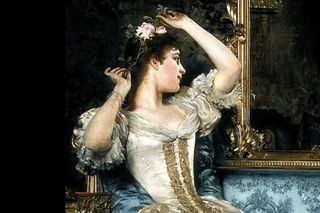
It’s Okay: To Care About the Way You Look
By mistaking self-love and personal grooming for vanity, society denies people a type of care they are entitled to.

In It’s Okay, we defend our most embarrassing, unpopular opinions.
In an ideal world, self-grooming should not be something one should have to justify. But what option does one have — anyone who openly cares about their appearance, looks or physique, is chalked off as superficial, self-indulgent, and in direct opposition to the sanskaar and values people should possess. Why have skincare regimes for the morning and evening? Why exercise four times a week? Why be particular about the ensemble you want to wear at a Zoom get-together next week? It’s not so much about the answers as it is about the question — why must people interrogate our desire to finetune our appearances?
Term it what they may — vanity, obsession, narcissism — anything that makes us feel good about ourselves, and doesn’t hurt anyone, should be held in good regard; therefore, wanting to look good shouldn’t need a sturdy defense. So, it’s okay if you want to pull out all the stops when it comes to grooming — why not?
Caring and grooming can be a form of self-care, even — pampering your skin, eating the right food, making time to exercise, and anything else that helps people take care of their health. Think of it is as an energy recharge for our minds and bodies. “Self-care is part of the answer to how we can all better cope with daily stressors,” Kelsey Patel, a Los Angeles–based wellness expert and the author of Burning Bright: Rituals, Reiki, and Self-Care to Heal Burnout, Anxiety, and Stress, tells Everyday Health.
There’s a reason people say when you think you look good, you feel good. A pandemic generation can perhaps attest to this: many have found themselves donning fancier outfits, maybe with a splash of jewelry, all while sitting at home, in order to add some color on dull days. We have been dressing up for brief interactions via four-inch squares on Zoom; it boosted our confidence and helped us feel fresh. Even soft-core physical activity that helps people take a break from morose routines has been proven to elevate mood, mental health, and self-perception. More so during a lockdown, when research shows that even going to a grocery store can be a positive change. One wonders then why ‘fitness’ and ‘freaks’ are sandwiched together.
Related on The Swaddle:
Respectfully Disagree: Is Vanity Always a Bad Thing?
Feeling satisfied and confident about one’s body and appearance is also known to boost self-esteem and performance. Studies have shown that people who feel confident about their looks, be it clothes or skin or hair, tend to do well in professional spaces.
So what exactly is wrong with wanting to take care of yourself, you ask? Self-grooming is often mistaken for self-indulgence: the activity turns into a vice because of mainstream associations with superficiality, narcissism, or just being plain selfish. As a rule, anything in excess is problematic — but who decides what is extra and what is enough when it comes to taking time out for yourself? Reducing self-worth to appearance is an unhealthy obsession, but grooming can exist in a balance where we can please ourselves without being called high maintenance. By mistaking self-love and personal grooming for vanity, society denies people a type of care we’re all are entitled to.
Objections to caring for and about one’s looks are often also the effect of a patriarchal hangover. Women have long held the burden of being arrogant, desperate, and shallow, while men who are preoccupied with their looks figure throughout history as ‘dandies‘: “a man unduly concerned with looking stylish and fashionable,” the dictionary says. Patriarchy blemishes our understanding of beauty and grooming, and the link is gendered and pernicious. “The patriarchy will have us believe that vain and conceit are feminine archetypes as old as time,” author Sindhu Rajasekaran writes in The Lipstick Politico. “Yet, the patriarchy continues to scrutinize our bodies and mark our worth based on our physicality. Hypocrisy much?”
“The beauty industry manipulates patriarchal and racist prejudices to sell its ware, and so working to combat this is important,” Rajasekaran adds.
Related on The Swaddle:
The Commercialization of Self‑Care Has Left Us Needing More Self‑Care
These stereotypes aren’t reserved only for one gender; men, non-binary folk, transgender people, and members from the LGBTQIA+ community can attest to feeling the glare of this oppressive spotlight and of not being allowed to express themselves. Acknowledging care for one’s appearance as self-care allows people to shoot multiple arrows at once: it does away with narrow definitions of what ‘men’ and ‘women’ ought to be like, as well as encourages people to invest in their individual health and grooming.
Of course, while self-grooming can be an exercise in rebellion against social dogmas, it can also unwittingly benefit the dirge of capitalism. Face masks, hair gels, and moisturizers are all great, but they fuel consumerism that feeds exploitative institutions and society’s misogynistic expectations for how women should look. Not to mention how capitalism interferes with the health and fitness sphere to sell lean bodies and well-defined muscles. It is important to acknowledge that wellness, after all, is an industry that will make money out of insecurities and shaming people. Patriarchy and capitalism are two evil twins: one mortified at the fact you care about your looks (while simultaneously objectifying you), the other feeding off your vulnerability and pushing you towards conventional (and oppressive) beauty standards.
But that doesn’t mean we eschew any and every act of appearance-related self-care. Instead of submitting to this vicious cycle, we can persevere and subvert the system in our own ways. You can still have beauty regimes and be conscious enough to not enable problematic, oppressive ideas — or pursue them.
We are swiftly drifting towards a self-care revolution where people are beginning to realize the power of celebrating themselves, but here’s a reminder anyway: it’s okay to love yourself.
Saumya Kalia is an Associate Editor at The Swaddle. Her journalism and writing explore issues of social justice, digital sub-cultures, media ecosystem, literature, and memory as they cut across socio-cultural periods. You can reach her at @Saumya_Kalia.
Related


The Buzz Cut: Sushmita Sen Got Flak for Sending Oxygen to Delhi. Does No Good Deed Go Unpunished?
